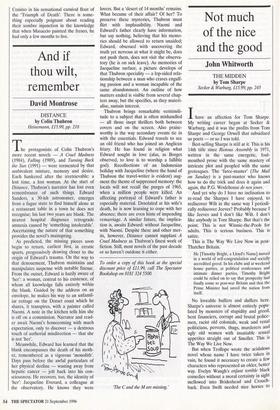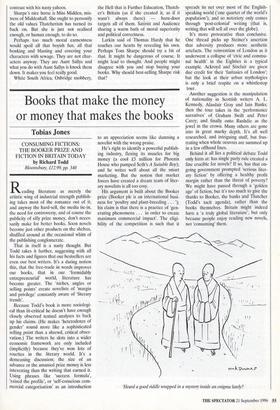Not much of the nice and the good
John Whitworth
THE MIDDEN by Tom Sharpe
Secker & Warburg, L15.99, pp. 245
Ihave an affection for Tom Sharpe. My writing career began at Seeker Warburg, and it was the profits from Tom Sharpe and George Orwell that subsidised us poets — or so I was told.
Best-selling Sharpe is still at it. This is his 14th title since Riotous Assembly in 1971, written in the same energetic, foul- mouthed prose with the same mastery of intricate plot and peopled with the same grotesques. The 'farce-master' (The Mail on Sunday) is a past-master who knows how to do the trick and does it again and again, the P.G. Wodehouse de nos fours. And yet why do I have no inclination to re-read the Sharpes I have enjoyed, to rediscover Wilt in the same way I periodi- cally rediscover Jeeves? Probably because I like Jeeves and I don't like Wilt. I don't like anybody in Tom Sharpe. But that's the point. This is not Winnie-the-Pooh for adults. This is serious business. This is satire.
This is The Way We Live Now in post- Thatcher Britain.
He [Timothy Bright, a Lloyd's Name] moved In a world of self-congratulation and socially accredited greed. In his clubs and at weekend house parties, at political conferences and intimate dinner parties, Timothy Bright could be relied on to say that prosperity had finally come to post-war Britain and that the Prime Minister had saved the nation from itself.
No loveable buffers and duffers here. Sharpe's universe is almost entirely popu- lated by monsters of stupidity and greed, bent financiers, corrupt and brutal police- men, racist old colonials, weak and venal politicians, perverts, thugs, murderers and ugly old women with insatiable sexual appetites straight out of Smollet. This is The Way We Live Now.
But when Trollope wrote the acidulous novel whose name I have twice taken in vain, he found it necessary to create a few characters who represented an older, better way. Evelyn Waugh's enfant terrible black comedies without a moral certainty in sight mellowed into Brideshead and Crouch- back. Even Swift needed nice horses to
contrast with his nasty yahoos.
Sharpe's nice horse is Miss Midden, mis- tress of Middenhall. She ought to personify the old values Thatcherism has turned its back on. But she is just not realised enough, or human enough, to do so.
Perhaps too much moral earnestness would spoil all that boyish fun, all that banking and blasting and covering your characters with sewage. They are not char- acters anyway. They are Aunt Sallys and what you do with Aunt Sallys is knock them down. It makes you feel really good.
White South Africa, Oxbridge snobbery, the Hell that is Further Education, Thatch- er's Britain (as if she created it, as if it wasn't always there) — barn-door targets all of them. Satirist and Audience sharing a warm bath of moral superiority and political correctness.
Larkin said of Thomas Hardy that he touches our hearts by revealing his own. Perhaps Tom Sharpe should try a bit of that. It might be dangerous of course. It might lead to thought. And people might disagree with you and stop buying your books. Why should best-selling Sharpe risk that?



















































































 Previous page
Previous page